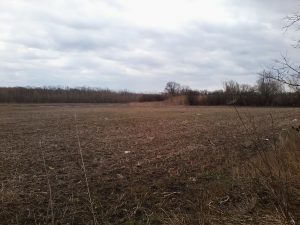$20.2 million bond auction completed for Mellody Farms in Vernon Hills
Gregory Harutunian for Chronicle Media — May 30, 2017
The Mellody Farms project in Vernon Hills, as it appeared in March 2016, has begun with grading and advance construction. A $20.2 million bond auction was completed May 16, as part of a funding agreement with Regency Centers, Inc., the project developer. (Photo by Gregory Harutunian/for Chronicle Media)
An auction for $20.2 million in general obligation bonds, earmarked as an incentive for the 272,250-square-foot Mellody Farms commercial and residential development in Vernon Hills, was completed May 16, fulfilling a commitment made by the municipality’s Village Board, made five months ago.
The board also approved registering the site with the county in January, as a tax-increment financing district with the county with funding to be released cumulatively for land improvement. The 20-year bond, with a five-year call for refinancing the outstanding amount, is aimed at an $18 million immediate reimbursement to the Florida-based developer, Regency Centers, Inc., which also has a campus in Oak Brook.
The remaining $2.1 million is slated for closing costs and interest payments. Located northeast of the intersection of routes 21 and 60, the project gained traction in late 2015, after numerous proposals over the last decade. The project is anticipated to become a major addition to the Vernon Hills Commercial corridor. When completed, the project is expected to earn $700,000 for the village coffers in sales tax revenues.
Village officials have stated that Regency has already secured lease agreements to anchor the development, along with other major retail stores such as Nordstrom, REI, and Home Goods. A three-story 260-unit apartment complex, as well as other retail outlots, is also in the mix. Advance construction landscaping began at the start of May
The real-time online bond auction was conducted by the Chicago firm of Speer Financial, Inc., and 11 bidders entered the fray with monetary proposals. The winning bid selected was by Robert Baird and Company, headquartered in Milwaukee. The group offered a 3.5 percent interest rate, and a final issue amount of $20.2 million on the bonds.
“Historically, we’ve been able to obtain better interest rates in that environment than a straight-out negotiated sale,” said Nicki Larson, the village’s Finance director. “The bonds issued has interest that is taxable, rather than the nontaxable bonds (for public projects) that carry a lower interest rate. Five years down the road, the project will be completed, and the stipulations of the agreement will have been removed.”
A $45,000 TIF feasibility study, from last year, helped forward the designation inclusive of areas in the parcel that were framed as blighted, due to discarded appliances and trash, but also contained wetlands.
Infrastructure improvements were a major consideration for the project, as well as the environmental impact on the parcel and surrounding perimeter. TIF districts freeze the equalized assessed valuation rate for a period of up to 23 years. Any monies generated above the rate are placed in a fund to facilitate the improvements. The TIF proceeds will begin to accrue this year, with eligible incentive disbursements from the account in 2018.
“Lake County handles sewer and water, we partnered for the infrastructure at the development site,” said Joe Carey, the village’s assistant village administrator. “This is a good partnership collaboration between the village, Illinois Department of Transportation for road improvements, and the county.
“We’re flexible and aware of changing retail models, and evolving business models,” he said. “This development gives up a sense of place, where people can go, shop, and have a good experience. The cost overall is estimated at $200 million, more from an investment base.”
Regency Centers initiated the effort in placing a mixed use of commercial entities and residential apartment dwellings on the parcel, where a large portion still supported agricultural production, as late as last year. The 134-acre parcel had 55 acres of topography identified as floodplain carved out for the TIF designation. It brought no impact concerns from the U.S. Army Corps of Engineers, or the Illinois Department of Natural Resources.
The development site was previously owned by the Cuneo family. Its name originated with the family’s Hawthorn-Mellody Farms enterprise that included a dairy, and a family attraction near the railroad tracks west on Route 21, and south of Artaius Parkway. At its 1960s zenith, the site had a zoo, a quonset-style dairy structure and store, and a 1.5-mile train ride that took visitors to a facsimile frontier town that doubled each Oct., as a ghost town.
By the 1970s, economic factors and a cost-prohibitive production model curtailed the venture and forced bankruptcy proceedings. The Cuneo Mansion is now owned by Chicago Loyola University, although the family trust maintains some holdings in the area.







